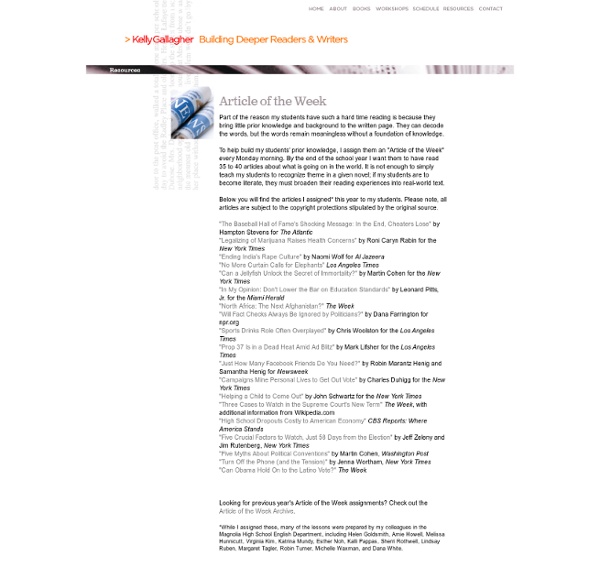Linguistadores | Learn English, French, German, Dutch, Spanish Free
30 Ideas for Teaching Writing
Summary: Few sources available today offer writing teachers such succinct, practice-based help—which is one reason why 30 Ideas for Teaching Writing was the winner of the Association of Education Publishers 2005 Distinguished Achievement Award for Instructional Materials. The National Writing Project's 30 Ideas for Teaching Writing offers successful strategies contributed by experienced Writing Project teachers. Since NWP does not promote a single approach to teaching writing, readers will benefit from a variety of eclectic, classroom-tested techniques. These ideas originated as full-length articles in NWP publications (a link to the full article accompanies each idea below). Table of Contents: 30 Ideas for Teaching Writing 1. Debbie Rotkow, a co-director of the Coastal Georgia Writing Project, makes use of the real-life circumstances of her first grade students to help them compose writing that, in Frank Smith's words, is "natural and purposeful." ROTKOW, DEBBIE. 2003. Back to top 2. 3. 4.
SNN - Student News Net
Thank you for visiting SNN. For 10 years, the same team of professionals has been producing SNN with a sharp focus on original, interesting content as both a mediator and motivator for learning. SNN has spent years studying the challenge of providing meaningful integration of technology in the classroom, conducting educational research, and working closely with teachers. The bottom line is that SNN today is aligned to basic principles of learning to support student achievement. Motivating students to read and explore a topic in more depth is one of SNN's greatest strengths. SNN's only source of revenue is subscriptions. Click here to learn about SNN's subscription options! Judith Stanford Miller, M.Ed., M.A.
The Reading & Writing Project CCSS
Based on long-term goals of college and career readiness for all students, as well as global readiness, the Common Core State Standards call for a general ramping-up of expectations for students at all levels, and specifically an attention to higher-level thinking skills as they play out in reading, writing, speaking, and listening. The TCRWP has studied the CCSS closely in order to understand their infrastructure, locate the standards that enable a host of other proficiencies, and adjust curricular plans in order to address potential instructional gaps. Lucy Calkins, Mary Ehrenworth, and Chris Lehman authored Pathways to the Common Core to help school districts rally to the challenges and opportunities the CCSS provide. Throughout our staff development, our leadership and specialty courses, conference days with teachers and school leaders, and institutes, the TCRWP aims to share information, insight and methods pertaining to the CCSS. We, the TCRWP Community, take the position that:
News in Easy English | Easy News for ESL Listening
The Sentence as a Miniature Narrative
Draft is a series about the art and craft of writing. I like to imagine a sentence as a boat. Each sentence, after all, has a distinct shape, and it comes with something that makes it move forward or stay still — whether a sail, a motor or a pair of oars. My analogy seems simple, but it’s not always easy to craft a sentence that makes heads turn with its sleekness and grace. Over the course of several articles, I will give you the tools to become a sentence connoisseur as well as a sentence artisan. At some point in our lives, early on, maybe in grade school, teachers give us a pat definition for a sentence — “It begins with a capital letter, ends with a period and expresses a complete thought.” Library of Congress But that definition misses the essence of sentencehood. For a sentence to be a sentence we need a What (the subject) and a So What (the predicate). I like to think of the whole sentence as a mini-narrative. “They shoot the white girl first.” — Toni Morrison, “Paradise”
DOGO News - Kids news articles! Kids current events; plus kids news on science, sports, and more!
Kindergarten CC writing guide



